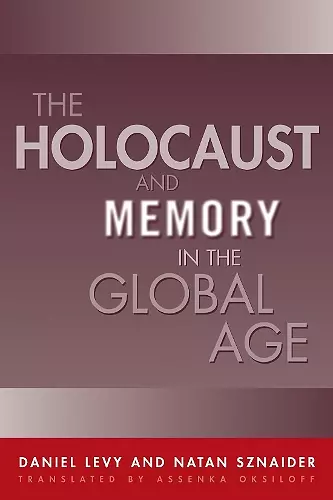Holocaust And Memory In The Global Age
Format:Paperback
Publisher:Temple University Press,U.S.
Published:8th Dec '05
Should be back in stock very soon
This paperback is available in another edition too:
- Hardback£72.00(9781592132751)

Examines the nature of collective memory in a globalized world, and how the memory of one singular event - the Holocaust - helped give rise to an emerging global consensus on human rights
Examines the way the Holocaust has been remembered in Germany, Israel, and the US. This title shows how singular event has been detached from its precise context and instead used as a way of focusing abstract questions of good and evil, and how this use has given the Holocaust a resonance across the global stage.Can collective memories of the past shape the future? If one of the fears about a globalized society is the homogenization of culture, can it nevertheless be true that the homogenization of memory might have a positive impact on political and cultural norms? Originally published in Germany, The Holocaust and Memory in the Global Age examines the nature of collective memory in a globalized world, and how the memory of one particular event-the Holocaust-helped give rise to an emerging global consensus on human rights. Daniel Levy and Natan Sznaider show how memories of the Holocaust have been de-contextualized from the original event and offer a framework for interpreting contemporary acts of injustice such as ethnic cleansing and genocide. Representations of mass atrocities in Bosnia and Kosovo during the 1990s resonated with iconographies of the Holocaust and played a significant role in the political and military interventions in the Balkans. Subsequently, these representations have had a crucial impact on the consolidation of international human rights and related issues of transitional justice, reparations, and restitution.
"Levy and Sznaider successfully demonstrate why 'holocaust'is no longer an exclusively Jewish or German concern. Their treatment of how the Holocaust is remembered, taught, memorialized, studied, and incorporated into law and policy in each of the three countries [Israel, Germany, and the US] as well as internationally is empirically rich and informative. Their larger argument about the decoupling of collective memory from national boundaries and the emergence of cosmopolitan meanings and concern is ingenious."-David Abraham, University of Miami School of Law "The Holocaust and Memory in the Global Age by Daniel Levy and Natan Sznaider is the definitive study of the Shoah in our new, global world. The authors analyze the Holocaust as a key to our understanding the construction of collective memory in a world driven by media. They examine the claims of the competing cultural uses of the Holocaust in film, popular history, and high theory, from Spielberg to Goldhagen to Bauman, and beyond. This is an important book not only because of the subtlety and intelligence of the authors, but because they take seriously the implications of using the Holocaust to pattern our own understanding of events in the twenty-first century."-Sander L. Gilman, Weidenfeld Professor of European Comparative Literature, St. Anne's College / Oxford "The authors have provided an excellent and insightful analysis of the way the Holocaust provides a core for modern society and a catalyst for a globalized human rights culture that privileges the identity of victims as a form for redressing their suffering."-Elazar Barkan, Professor of History and Cultural Studies, Claremont Graduate University "This translation makes a highly original contribution to holocaust, human rights, and globalization scholarship. Levy and Sznaider's rich comparative and historical analysis of responses to the Holocaust over time yields significant theoretical insights, which illuminate how memory culture is being constructed and diffused in an increasingly global world, and persuasively argues for its importance in laying a basis for cosmopolitan identity."-Ruti Teitel, Ernst C. Stiefel Professor of Comparative Law, New York Law School, and author of Transitional Justice
ISBN: 9781592132768
Dimensions: 210mm x 140mm x 18mm
Weight: unknown
240 pages